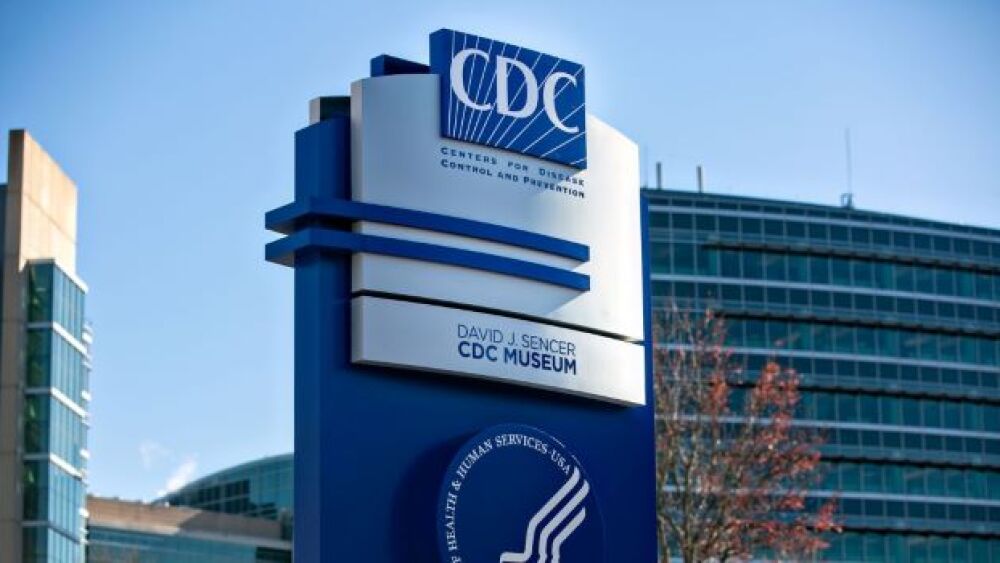The CDC is taking a proactive stance and establishing a center that will use forecasting and outbreak analytics to guide public health decision-making.
CDC /Courtesy of Jason Armond, Los Angeles Times via Getty Images
The current pandemic has only reinforced the reality that novel viruses and diseases pose an ongoing global threat. COVID-19 swept across the globe in a matter of months, shutting down the global economy as people underwent strict lockdown and social distancing protocols to mitigate the threat while the biopharmaceutical industry rushed to develop therapeutics and vaccines.
Even in the grips of a pandemic, the U.S. Centers for Disease Control and Prevention is taking a proactive stance and establishing a center that will use forecasting and outbreak analytics to guide public health decision-making. The CDC’s new Center for Forecasting and Outbreak Analytics brings together next-generation public health data, expert disease modelers, public health emergency responders and high-quality communications in order to meet the needs of decision-makers in the United States and across the globe.
This new project is expected to come online in 2022. When operational, it will provide the decision-makers with accelerated access to data enabling them to mitigate any effects of an outbreak, which could include social and economic disruption. Additionally, the CDC said it will “prioritize equity and accessibility” all while serving as a central hub for innovation and research on disease modeling.
CDC Director Dr. Rochelle P. Walensky hailed the establishment of the country’s first government-wide forecasting center aimed at public health. Walensky said the center will have the expertise to not only model and forecast public health concerns, but also to share that information in order to facilitate a proper response.
“The new center will meet a longstanding need for a national focal point to analyze data and forecast the trajectory of pandemics with the express goal of informing and improving decisions with the best available evidence,” Dr. Marc Lipsitch, the center’s Director of Science said in a statement. “I am thrilled to be working with a great team at CDC to set it up, and excited to integrate the best and most innovative ideas from academia, the private sector, and government to make this a reality that will truly improve our response to future pandemics, and indeed to other infectious diseases.”
Joining Lipsitch will be Dr. Dylan George, who will serve as Director for Operations, Dr. Caitlin Rivers, who will take on the associate director role and Dr. Rebecca Kahn who comes on board as the center’s senior scientist.
“I am thrilled to be joining an exceptional team at CDC to build new capabilities for the fight against pandemics,” George said. “Pandemics threaten our families and communities at speed and scale – our response needs to move at speed and scale, too. The Center will provide critical information to communities so we can respond efficiently and effectively. The U.S. desperately needs this capability, and I am grateful for the opportunity to help build it.”
For sure, the CDC is not the only organization or company to adopt a pandemic preparedness model. For years, Maryland’s Zalgen Labs, which describes itself as a pandemic preparedness company, has warned of the threat of infectious diseases from parts of Africa. The company has extensively studied the threats of the Lassa virus, as well as Ebola. Both of these viruses are endemic to parts of West Africa, but have the potential to become pandemics. The company developed the first rapid diagnostic test for Lassa fever and is also developing therapeutics against the animal-borne hemorrhagic virus. Additionally, Zalgen is developing Arevirumab-3, a first-in-class immunotherapeutic for prophylaxis and post-exposure treatment of Lassa fever. The company is also developing bi-specific antibodies against Lassa.
North Carolina-based Heat Biologics is also taking a proactive stance against potential pandemic threats. This week, the company established its Biothreat Advisory Board. Heat Chief Executive Officer Jeff Wolf said the board was created to support its biosecurity/biodefense initiative, which was originally conceived as a result of the ongoing pandemic.
“We recognized the need for versatile and timely response solutions to protect the U.S. against known or unknown future biological threats and embarked on the development of a platform to address this issue,” Wolf said in a statement. “Our Biothreat Advisory Board brings deep insight and relationships that we expect will be instrumental in advancing our new biothreat initiatives. We look forward to providing more details as developments unfold.”
Advisory board members include Andrew C. Weber, the former Assistant Secretary of Defense for Nuclear, Chemical & Biological Defense Programs, as well as Gregory Koblentz, Associate Professor at George Mason University and expert on chemical and biological weapons. Also on the board are David Lasseter, the former Deputy Assistant Secretary of Defense for Countering Weapons of Mass Destruction, and former U.S. Rep. Jack Kingston, who also serves as the Secretariat of the Alliance for Biosecurity, a consortium of companies and organizations that develop products for the response to national security threats.





